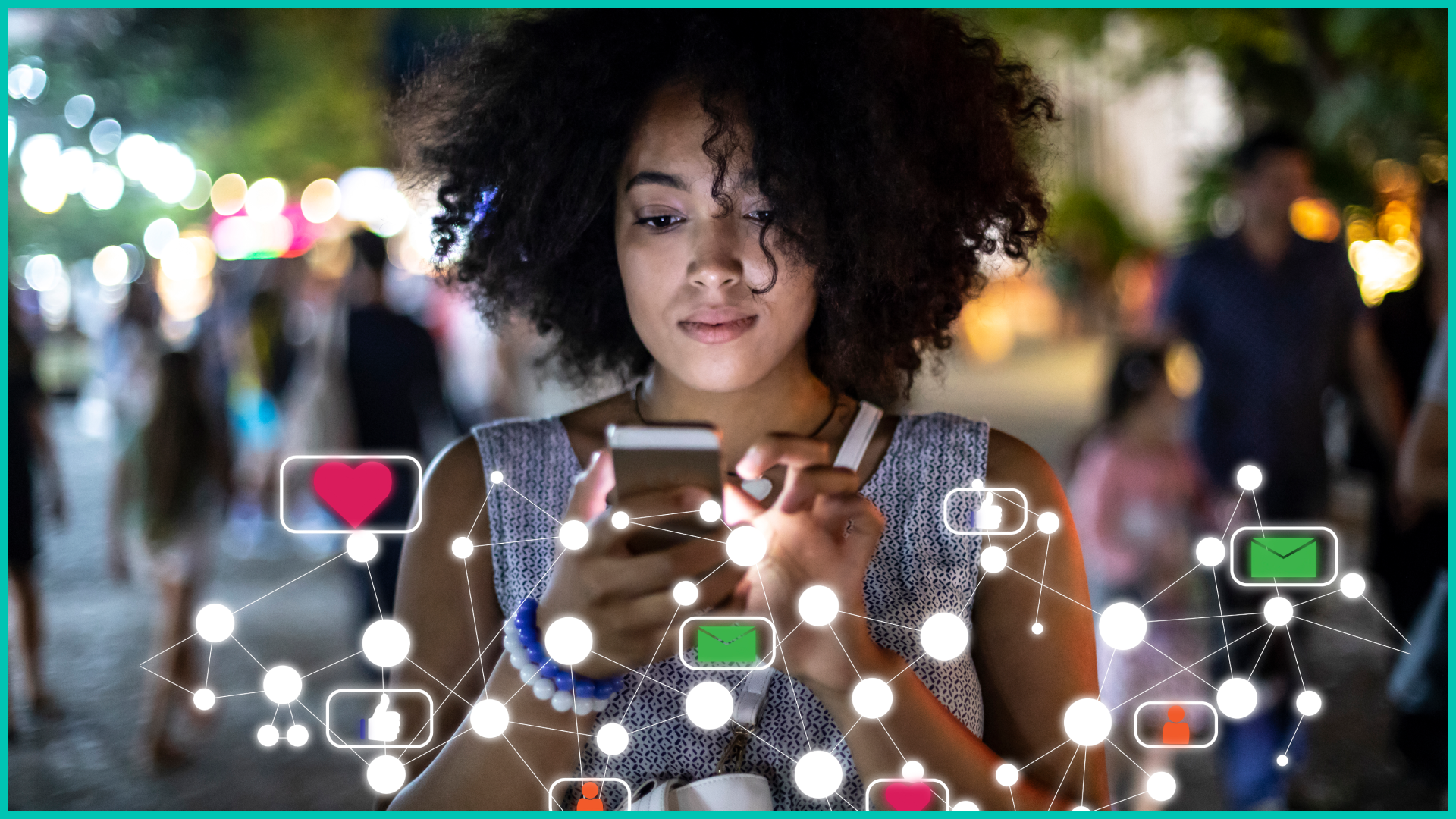For years, wireless carriers like AT&T, T-Mobile, and Verizon have been working on bringing 5G to the public. Aka the fifth generation of wireless tech. Think of it as an upgrade from its little brother 4G — and it’s supposed to be wayyy faster and create more innovation. From allowing autonomous cars to communicate in real time on the road to having doctors perform remote surgery. (Yes, really.)
If the pandemic’s shown us anything, it’s that reliable and fast connectivity is a must-have. For everything from remote school and work, to ordering medication and groceries. Now, this fancy new tech will let millions of Americans access faster wireless service than ever before. Courtesy of AT&T and Verizon. So we're breaking down what you need to know about it. And how it could impact your tech. With the help from a mobile tech expert.

What Is 5G and Why’s It Getting A High-Five
While 3G helped our phones connect to the internet and 4G meant we could binge Netflix anywhere, 5G speeds everything up. By…a lot. Specifically, it’ll be up to 100 times faster than 4G. And have an “almost instantaneous response time,” according to the FCC. Here's the nitty (5)Gritty…
Faster downloads and uploads: 4G allows us to download full-length movies in minutes. 5G can cut that down to as little as 15 seconds. And allow you to upload your TikTok vid much faster.
Clearer picture: You might want to click 'camera on' for remote work meetings. 5G could mean no lag on Zoom calls — meaning clearer video chats on the go.
Streaming and VR makeovers: The video game lover in your life could soon be living in the clouds with faster and clearer streaming. And 5G could also enhance the VR experience (think: make it more mobile so you can enter the virtual world from anywhere). Meta probably can't wait.
Increased bandwidth: Because 5G will have more bandwidth, your service shouldn’t lag. Plus, more devices will be able to connect to the 5G network at once.
Experts have high expectations for 5G to boost several industries — from agriculture to telehealth. Bill Menezes, director advisor at Gartner, says things like smart manufacturing and smart warehousing could also see a revamp.
You might be wondering, 'do I have 5G on my phone?' If you've previously seen a 5G icon on your phone, it's not the full-speed version we've all been waiting for. That’s because 5G’s been on a low-band spectrum — which is essentially the same as 4G LTE — for years. Now, carriers will be amping it up to midband airwaves (aka C-band), which balances speed and coverage.
On Jan. 19, AT&T and Verizon started releasing their 5G C-band service. And they promise it’ll be harder, better, faster, stronger than the generations before it. “What AT&T and Verizon are going to be doing is essentially turn on 5G service using new airwaves that they bought from the federal government over the last couple of years,” Menezes told theSkimm. “It's going to add a huge amount of capacity to their network. So, more people using more data at the same time is going to be possible if you've got a 5G device.”
The Caveats to the New 5G Rollout
Here's the bad news…the new 5G won’t be available to everyone in the US right away. Like the generations before it, it’ll take time (read: years) for it to be widespread. Here’s what we know so far:
AT&T: In 2021, the carrier said it expected to cover up to 75 million people with its new service, called 5G+, by the end of 2022. And up to 200 million in 2023. You’ll know if you have it if you see “5G+” on your phone.
T-Mobile: The company is ahead of the game. It currently offers its Ultra Capacity 5G to 200 million people nationwide. But it expects that number to grow as it jumps on the C-band airwaves next year.
Verizon: It plans to cover 100 million people in January with its 5G Ultra Wideband network. First up: major metropolitan cities like NYC, LA, Chicago, San Francisco, and Boston.
PS: Here’s how to check if the new 5G will be available in your area via AT&T and Verizon.
But some airports across the country won’t be flying high with C-band, including Chicago O’Hare, JFK in NYC, and LA International. For months, airlines have worried that the new 5G frequencies could interfere with those used on planes (think: for measuring things like altitude). Verizon and AT&T have previously pushed back their 5G rollout amid concerns that interference could cause flight delays (something that's already a problem in part because of COVID-19 staffing shortages). The carriers have also agreed to the FAA's buffer zones — aka 50 airports —“to minimize potential 5G interference with sensitive aircraft instruments.” But airline CEOs say 'that's not enough.' And wrote a letter calling on the Biden admin to step in and create a larger buffer zone within certain airports. Fast-forward and AT&T and Verizon answered the call, agreeing to delay their new 5G service near some airports.

How 5G Could Impact Your Tech Gadgets
Will you need a new cellphone plan? It depends on your carrier. AT&T has added 5G+ to most of its unlimited plans. And Verizon has started offering new options for phones, homes, and businesses that want to maximize use of the new 5G network.
Here's what you can do to get your hands on it ASAP:
Inspect your gadget: iPhones 12 and 13 will support the new 5G. As will others, including Samsung's Galaxy S21 and Galaxy Z Flip 3. Google's Pixel 6 and 6 Pro could also support the new tech.
Software updates: Gadgets might need a software update to access a carrier’s 5G service. But it’s unclear when those updates would roll out.
If you don’t have 5G devices: The FCC says “4G devices will continue to work.” If you have an older device, it may only offer 3G service. Check with your carrier if you have any questions.
And before you go add any new devices to your cart, Menezes recommends people pause and do some research. Because you may not need to buy anything.
“Unless you have a really good reason, you really don't have to update your devices and pay a lot of money to get 5G. Your next device will be getting it anyway,” he said.
Oh, and your WiFi feature is safe and sound, Menezes told us. Because that’s a “different network.”
PS: We’ve got more on how 5G could affect your wallet here.
theSkimm
At a time when connectivity has become crucial for work, schooling, shopping, and everything else, a new 5G could seriously enhance our daily lives. But whether it lives up to the hype is TBD. And if we know one thing, it’s that there will be new demand for better and faster service. Can you say, ‘6G?’
Live Smarter
Sign up for the Daily Skimm email newsletter. Delivered to your inbox every morning and prepares you for your day in minutes.
